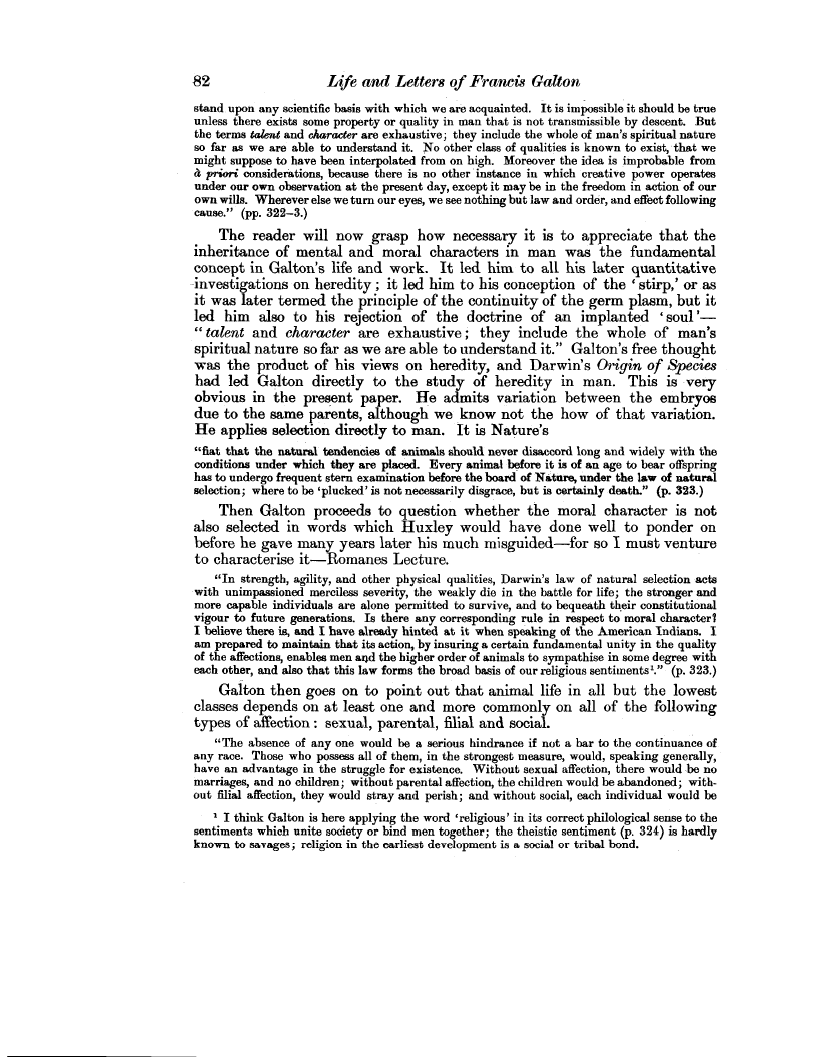82 Life and Letters of Francis Galton
stand upon any scientific basis with which we are acquainted. It is impossible it should be true unless there exists some property or quality in man that is not transmissible by descent. But the terms talent and character are exhaustive; they include the whole of man's spiritual nature so far as we are able to understand it. No other class of qualities is known to exist, that we might suppose to have been interpolated from on high. Moreover the idea is improbable from a priori considerations, because there is no other instance in which creative power operates under our own observation at the present day, except it may be in the freedom in action of our own wills. Wherever else we turn our eyes, we see nothing but law and order, and effect following cause." (pp. 322-3.)
The reader will now grasp how necessary it is to appreciate that the inheritance of mental and moral characters in man was the fundamental concept in Galton's life and work. It led him to all his later quantitative -investigations on heredity ; it led him to his conception of the ` stirp,' or as it was later termed the principle of the continuity of the germ plasm, but it led him also to his rejection of the doctrine of an implanted 'soul'" talent and character are exhaustive ; they include the whole of man's spiritual nature so far as we are able to understand it." Galton's free thought was the product of his views on heredity, and Darwin's Origin o f Species had led Galton directly to the study of heredity in man. This is very obvious in the present paper. He admits variation between the embryos due to the same parents, although we know not the how of that variation. He applies selection directly to man. It is Nature's
"fiat that the natural tendencies of animals should never disaccord long and widely with the conditions under which they are placed. Every animal before it is of an age to bear offspring has to undergo frequent stern examination before the board of Nature, under the law of natural selection; where to be 'plucked' is not necessarily disgrace, but is certainly death." (p. 323.)
Then Galton proceeds to question whether the moral character is not also selected in words which Huxley would have done well to ponder on before he gave many years later his much misguided-for so I must venture to characterise it-Romans Lecture.
"In strength, agility, and other physical qualities, Darwin's law of natural selection acts with unimpassioned merciless severity, the weakly die in the battle for life; the stronger and more capable individuals are alone permitted to survive, and to bequeath their constitutional vigour to future generations. Is there any corresponding rule in respect to moral characters I believe there is, and I have already hinted at it when speaking of the American Indians. I am prepared to maintain that its action, by insuring a certain fundamental unity in the quality of the affections, enables men aid the higher order of animals to sympathise in some degree with each other, and also that this law forms the broad basis of our religious sentiments'." (p. 323.)
Galton then goes on to point out that animal life in all but the lowest classes depends on at least one and more commonly on all of the following types of affection: sexual, parental, filial and social.
"The absence of any one would be a serious hindrance if not a bar to the continuance of any race. Those who possess all of them, in the strongest measure, would, speaking generally, have an advantage in the struggle for existence. Without sexual affection, there would be no marriages, and no children; without parental affection, the children would be abandoned; without filial affection, they would stray and perish; and without social, each individual would be
' I think Galton is here applying the word `religious' in its correct philological sense to the sentiments which unite society or bind men together; the theistic sentiment (p. 324) is hardly known to savages; religion in the earliest development is a social or tribal bond.

